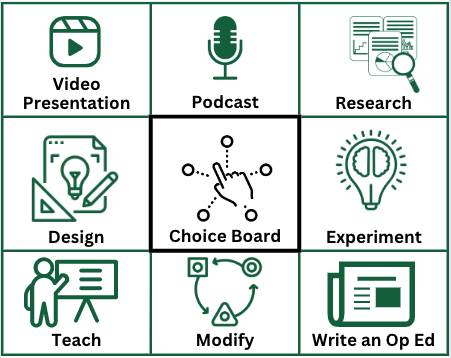Considerations for creating an open-book exam
An alternative to the traditional time-constrained invigilated final exam is the open-book exam. “Open-book” implies that learners will have access to some type of references or resources during the exam, but the level of access to resources and time constraints are variables controlled by the instructor depending their exam design decisions.
If you are considering an open-book exam, here are some things to keep in mind:
- Focus on the Learning Outcomes – When making decisions about exam design and the types of questions you are going to have on your exam, think about the most important things you want your students to come away knowing (your learning outcomes / key topics) at the end of your course. Ask yourself:
- “Are there any learning outcomes in my course that require time constraints or limited access to resources for students to show me that they have met those outcomes?” If there are, you will need to consider the amount of time students will have to complete the exam and if some amount of exam invigilation is required.
- “How can I get my students to show me they have learned the course learning outcomes?” You may need to reframe questions that focus on recall or reproducing information to questions requiring learners to demonstrate how they use the information they have learned.
- Use of Resources – Students will have access to an abundance of resources and it will prove difficult to limit access to resources without invigilation. A few ideas to consider:
- Reshape the assessment scenario: use context-rich scenarios-specific questions to reduce the possibility of quick Google answers.
- Specify resources: specify which resources must be used or limit the resources to a few small excerpts of resources and ask students to demonstrate their course knowledge (compare/contrast, discuss, analyze etc). Help your students by providing information in advance on how to prepare and which resources to include.
- Student Collaboration: see HERE for information on limiting non-permitted collaboration or building collaboration into your exam.
- Time Length – Ensure there is adequate time for students to complete the open-book exam.
- Typically, these exams take longer than closed-book exams, but make your time expectations realistic and clear (4 hours, 24 hours etc).
- Help your students by sharing how they could organize their time – a good guideline is spend half the time on preparing and collecting information and half on writing the exam.
- Grading – Have clear grading criteria and let students know in advance how they will be graded.
- Remember to keep your weighting on the skills you are assessing (demonstrating critical thinking, synthesis etc.) rather than on basic knowledge and recall. **It is important to note that students should be well accustomed to these types of higher order questions prior to taking the exam (provide practice opportunities with clear marking rubrics over the course of the term for students to get accustomed to your expectations).
- Preparing a marking rubric (see examples) with your outcomes in mind for each question on the exam will prove invaluable and save time when marking.
- Communication – Be clear about how students will access the exam and where / when they are required to submit the exam. Also be clear and transparent with your students about your exam design decisions and clearly communicate these to your students along with your grading criteria.
- Academic Integrity – Consider using a personalized formal academic integrity statement to minimize academic integrity concerns. Sample – Open Book Exam Academic Integrity Statement (Word Doc)
Additional Resources:
- Best Practices: Open Book Exams developed by Ryerson University
- Designing Open-Book Exams developed by Concordia University
- Open-book Examination, Assessment Resources developed by University of Hong Kong.
- Take-Home Exams in Higher Education: A Systematic Review by L. Bengtsson
- The University of New South Wales: Using assessment tools in Moodle
- A guide for academics – Open book exams developed by the University of Newcastle Australia


